Medicinal Chemistry with a Year in Industry
UCAS code F1B3
- Study mode
- Full-time
- Duration
- 4 years
- Start date and application deadlines
-
- Start date
UCAS code F1B3
Ignite your curiosity and shape your future with our BSc Medicinal Chemistry with a Year in Industry programme. This degree combines essential knowledge with the opportunity to specialise, along with a full year gaining valuable hands-on experience in the pharmaceutical and related industries.
Study Medicinal Chemistry at Liverpool and learn in a culture of research excellence. Medicinal chemistry is a great choice for those with a keen interest in medicinal chemistry, digital chemistry, analytical chemistry and sustainability, alongside traditional areas of organic, inorganic, physical and theoretical chemistry.
The BSc degree in Chemistry equips graduates for a range of career opportunities in academic or industrial research, pharmaceutical and chemical industries, and other fields requiring strong scientific and numerate skills. The programme also provides a foundation for further study in specialized or interdisciplinary areas of medicinal chemistry and pharmacology. The programme offers a mix of interactive teaching, and practical work in our award-winning undergraduate laboratories, ensuring students develop advanced research skills, professional competencies, and a broad understanding of chemistry’s real-world applications.
Students gain hands-on experience through a year 3 project (1/4 of the year) with a range of options available through our teaching laboratories, research groups, international internships and wider industry which is linked to medicinal chemistry.
You’ll also spend your final year on a paid external/industrial placement, acquiring experience and awareness of practical chemistry in an industrial environment to further develop your commercial and professional skills.
The assessment strategy combines formative workshops and interactive lectures with summative methods including traditional exams, group projects, professional skill development and laboratory-based activities. Since students enter the Department with a wide range of experience in mathematics, physics and biology, which are essential for studying chemistry to a high level, we provide supportive sessions allowing you to tailor your development. With a common first 2-2.5 years, the opportunity to move onto an MChem programme is flexible upon successful progression requirements and allows you to keep your options open with you changing career ambitions.
This degree is designed to help you graduate with strong knowledge of medicinal chemistry, practical laboratory skills, and problem-solving abilities valued in pharmaceutical research, drug development, and a wide range of scientific careers from industry to education and beyond.
Please note, course information has been updated for entry 2026.
This programme has bachelor accreditation from the Royal Society of Chemistry (RSC) ensuring your degree with us will set you on the pathway to a successful career.

The Royal Society of Chemistry is a learned society for chemists in the United Kingdom.

We’re proud to announce we’ve been awarded a Gold rating for educational excellence.

We want you to feel welcome from the moment you apply to study at Liverpool. We offer lots of support for our students who are moving from abroad. We can welcome you at Manchester Airport with our meet and greet service (for September starts) and we have a friendly International Advice and Guidance team who run events to welcome you on to campus and provide in person support and events all year round.
Discover what you'll learn, what you'll study, and how you'll be taught and assessed.
In Year 1, you’ll study core chemistry topics, explore its broader context and start your specialism in medicinal chemistry. You’ll engage in up to 6 hours weekly of practical chemistry across synthetic, measurement, and digital areas. A flexible foundations module supports varying levels in maths, physics, and biology whilst building professional skills.
Please note some listed modules are currently awaiting approval and may be subject to change.
Compulsory modules
Programme details and modules listed are illustrative only and subject to change.
In Year 2, your journey of core chemistry continues, including aspects of analytical, sustainable, spectroscopy, symmetry, quantum and synthetic strategy/design which is further supported by modules in partnership with Pharmacology.
Practical skills build on year 1 themes, operating in alternating weeks of up to 12 hours supplemented by supported analysis/report sessions. Development of quantitative and professional skills continue alongside medicinal chemistry.
Please note some listed modules are currently awaiting approval and may be subject to change.
Compulsory modules
Programme details and modules listed are illustrative only and subject to change.
In year 3, you’ll study advanced core topics with clear links to our research themes and further core study of medicinal chemistry and pharmacology. Semester 2 can be tailored through the choice of a research-connected optional module with links to the medicinal chemistry sector. Module availability may vary yearly as we develop/adapt to sector demands.
You’ll complete a 30 credit extended project through our teaching laboratories, research groups, international internships or wider industry and up to 30 credits of advanced practical skills, modelling and industrially linked activities.
Please note some listed modules are currently awaiting approval and may be subject to change.
Compulsory modules
Optional modules
Programme details and modules listed are illustrative only and subject to change.
You’ll also spend your final year on an external/industrial placement, acquiring experience and awareness of practical chemistry in an industrial environment to further develop your commercial and professional skills.
Programme details and modules listed are illustrative only and subject to change.
A knowledge of core chemistry is fundamental to any chemistry degree. For all years of study, core chemistry material is delivered in a series of interactive lectures, with the interdisciplinary nature of chemistry showcased appropriately. Core concepts are contextualised with publications of recent scientific research whilst encouraging students to be critical of such material, building digital fluency alongside engaging with traditional and modern digital platforms. This is supported by plentiful workshops run by academics to help practice application of material in a supportive and constructive way.
We embrace the diverse nature of our students, whether through their background or pre-university qualification, by offering foundation modules to ensure students have reached a particular competency to progress in wider subjects such as maths, physics and molecular biology. Practical work follows three main themes of synthetic, measurements and digital chemistry across years 1 to 3 with supported assessment preparation time offered to students. We make use of portfolios throughout all lab courses to give students space to fail, reflect and improve to develop lifelong learning. Numerous collaborative group work activities across core modules allow students to consider and discuss major societal and environmental challenges such as UN SDGs and green chemistry principles. Additionally, group work based around applications of industrial research allow further understanding of how industrial processes relate to planetary boundaries and global systems.
We believe the development of the person is core to success, through enhancing professional, employability and entrepreneurial skills via embedded activities throughout all years of our core curriculum including reflective activities, group work, presentations, posters and peer-to-peer activities. Confidence building is developed continuously through discursive and interactive sessions, with learners contributing ideas and analysis in a ‘safe space’ for sharing of ideas and expertise. Additional support is available via our academic advisors to encourage personal development planning for the students.
In the final year students join an external paid placement complete a major research project under the supervision of an expert in their field. These research projects usually are of high quality and can result in publications in respected journals, patents, etc.
All years of study (with the exception of Year 1) contribute to the final degree classification. Traditional examinations test learning and problem solving and make and range from 2-4 exams accounting for ~40-50% of our programmes. We supplement this with a range of assessments which are designed to mimic the formats used in employment and postgraduate environments, supporting student preparedness for future careers including:
Feedback is designed to be timely and developmental, helping students self-assess and progress in a structured, supportive environment. Examples include:
Inclusive and accessible practices are embedded throughout our course material design and deployment, such as templates using accessible fonts and colour schemes and prompt release onto our virtual learning environment. Our assessments and feedback are supported in numerous ways:
We have a distinctive approach to education, the Liverpool Curriculum Framework, which focuses on research-connected teaching, active learning, and authentic assessment to ensure our students graduate as digitally fluent and confident global citizens.
The Liverpool Curriculum framework sets out our distinctive approach to education. Our teaching staff support our students to develop academic knowledge, skills, and understanding alongside our graduate attributes:
Our curriculum is characterised by the three Liverpool Hallmarks:
All this is underpinned by our core value of inclusivity and commitment to providing a curriculum that is accessible to all students.
Studying with us means you can tailor your degree to suit you. Here's what is available on this course.
University of Liverpool students can choose from an exciting range of study placements at partner universities worldwide.
Immerse yourself in Chinese culture on an optional additional year at Xi'an Jiaotong Liverpool University in stunning Suzhou.
Take a semester of your second year of study at one of our worldwide partner institutions.
Spend a summer abroad on a study placement or research project at one of our worldwide partner institutions.
This course is also available without an included year in industry.
View Medicinal Chemistry BSc (Hons)
To spend a year in industry, you'll need to secure a placement with an organisation. If you're unable to find a placement, you'll continue with the standard version of the course without a year in industry.
Every student at The University of Liverpool can study a language as part of, or alongside their degree. You can choose:
Our excellence in research strongly influences our teaching, and ensures that you’re engaged in frontier science throughout taught and project modules. Our state-of-the-art Central Teaching Laboratories offer a unique environment in which to study Chemistry, which occupies the top in synthetic and measurement labs, with plentiful equipment for a wide range of experiments.
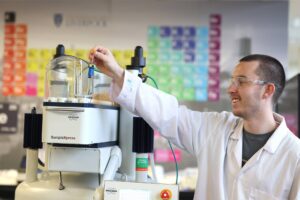
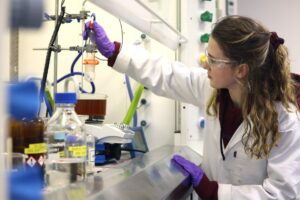
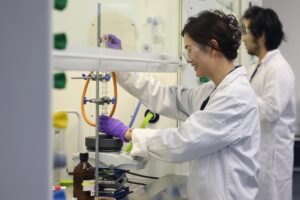
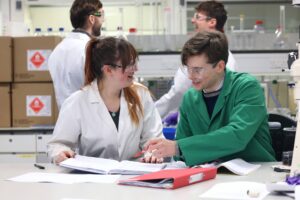
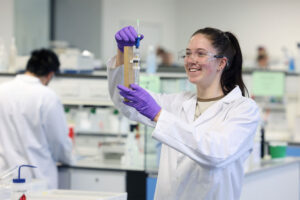
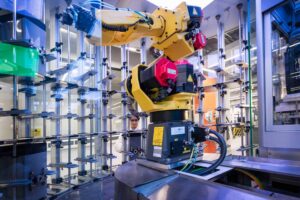
From arrival to alumni, we’re with you all the way:

The research that takes place in the chemistry department here in Liverpool is internationally leading. It makes huge impacts around the world.

Want to find out more about student life?
Chat with our student ambassadors and ask any questions you have.
The rigorous nature of a Chemistry degree is well recognised by employers meaning our graduates are well qualified to take up employment in a variety of fields in addition to chemistry across the chemical sciences, related industries and the general graduate market.
Skills developed include high numeracy and problem-solving abilities, enhanced communication skills, building resilience and confidence to tackle complex, open-ended challenges. Embedded professional skills development, and industry aligned visits and activities (including pharmaceutical industry, fast-moving consumer goods, energy sector, nuclear industry, forensics, patent law), ensure that you make contacts with prospective employers at key stages in your programme.
Typical careers of our graduates beyond moving onto postgraduate studies include:
Our graduates are employed by a vast range of employers, over 160 spanning the last 5 years. Some recent employers include:
9 in 10 chemistry students find their main activity after graduation meaningful.
(Graduate Outcomes, 2021-22.)
Hear what graduates say about their career progression and life after university.
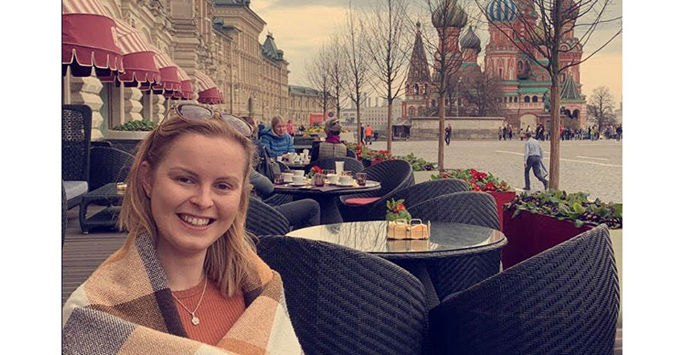
Victoria is graduated from our BSc Chemistry with a year in industry degree in 2020. She received an offer to work as a Global Operations Graduate Associate at AstraZeneca.
Your tuition fees, funding your studies, and other costs to consider.
Full-time place, per year - £9,535
Year in industry fee - £1,905
Full-time place, per year - £32,000
Year in industry fee - £1,905
Please note, UK full-time fees, year abroad and year in industry fees are for the academic year 2025/26. 2026/27 fees have yet to be confirmed. Please be advised that tuition fees are subject to increase each year.
Tuition fees cover the cost of your teaching and assessment, operating facilities such as libraries, IT equipment, and access to academic and personal support. Learn more about paying for your studies.
Your tuition fee covers almost everything but you may have additional study costs to consider, such as books.
Find out more about the additional study costs that may apply to this course.
We offer a range of scholarships and bursaries that could help pay your tuition and living expenses.
If you’re a high-achieving international student starting an undergraduate degree with us from September 2024, you could be eligible to receive a fee discount of up to £5,000. You’ll need to achieve grades equivalent to AAA in A levels. Most of our undergraduate degrees are eligible, with the exception of clinical programmes in Medicine and Dental Surgery.
Completed a Kaplan Digital Pathways Foundation Certificate? We’re offering a £5,000 fee discount off the first year of undergraduate study for a maximum of two high achieving students joining one of our non-clinical degrees from an online Kaplan Foundation Certificate.
Apply to receive tailored training support to enhance your sporting performance. Our athlete support package includes a range of benefits, from bespoke strength and conditioning training to physiotherapy sessions and one-to-one nutritional advice.
Completed a Foundation Certificate at University of Liverpool International College (UoLIC)? We’re offering a £5,000 fee discount off the first year of undergraduate study to some of the highest achieving students joining one of our non-clinical degrees from UoLIC.
We’re offering a £1,000 fee discount for years 2 and 3 of undergraduate study to eligible students progressing from University of Liverpool International College. You’ll need to be studying a non-clinical subject and get an average of 70% or above in year 1 of your degree.
If you’re a University of Liverpool International College student awarded a Kaplan Impact Scholarship, we’ll also consider you for an Impact Progression Scholarship. If selected, you’ll receive a £3,000 fee discount off the first year of your undergraduate degree.
Have a question about this course or studying with us? Our dedicated enquiries team can help.
Last updated 16 October 2025 / / Programme terms and conditions